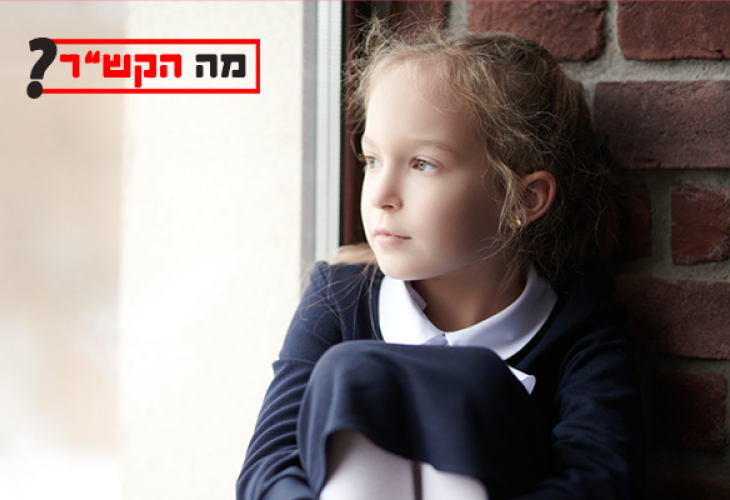Navigating Summer Break: Reflections on ADHD and Social Challenges
What is it about Mikhal that worries me so much? How can such a sweet child struggle to connect with peers and not fulfill her vast potential?
 (Illustrative Photo: shutterstock)
(Illustrative Photo: shutterstock)Previous episode: What's the Connection between ADHD and Focus?
And so, first grade came to an end.
By the end of the year, Mikhal can read, but slowly. Reading doesn't entertain her, and she shows little interest in it. Her first-grade notebooks, neatly packed in a school-issued bag, are only half-full and, unsurprisingly, undecorated. Her backpack is cluttered with random scraps. Friends—well, there are none.
Her end-of-year report card worried me: What would it say? How would it affect her? To my surprise, Mikhal received a perfect report card. How was that possible? Surely, at least in the "Orderliness and Neatness in Books and Notebooks" section, the score should have been lower... The teacher explained that "In first grade, everyone gets good scores because it's their first year, and we don't want the kids going home upset." I still can't tell if this approach is healthy for the kids or lulls them and their parents into complacency.
And then—summer break. Mikhal immediately declared she didn't want to enroll in the school camp. I also saw it as pointless for her: another place where she'd struggle socially, without the supervision of professional, experienced teachers.
Mikhal stayed home, spending her summer days mostly playing with her siblings. But while her older sister went out occasionally, met with friends, talked on the phone, and made plans, Mikhal was alone. No friend called her—and she didn't call anyone, neither on her own nor following my suggestions. It seemed as if she was saying, "At last, I don't have to be with those kids every day, please don't make me."
So, I didn't force her.
But I did use the long days at home to observe her, to try to understand the challenges she's facing, the reasons behind her many difficulties at school.
We tried to maintain a routine during the vacation, using various tools we got from Kogfan to organize the day and help Mikhal have meaningful days, not just idle ones. This was also when I realized that even though Mikhal isn’t rambunctious or hyperactive and doesn't cause damage at home, she still needed medication during the holidays. Without it, she spent most of her day on the floor, refusing to get up, refusing to dress, refusing to eat, declining any proposal that didn’t significantly ignite her imagination. The medication allowed her to get up, move around the house, and find engaging pastimes, even if they didn’t overly excite her.
Everything was, actually, fine.
It was just me who wasn't at peace.
What is it about Mikhal that worries me so much? What is it about this wonderfully sweet, emotionally filled child, full of love and goodwill—that drags her into such sadness, drives peers away, and prevents her from realizing the immense potential I saw in her just a few years ago?
I began researching social difficulties, learning challenges, and their interplay and suddenly understood: Mikhal's way of communicating with those around her isn't typical. I couldn't pinpoint what disturbed me, but I knew something was there. I felt I had stumbled upon something not previously discussed.
I noticed Mikhal interprets things quite literally. When I said my "head was exploding," she panicked and tried to figure out how to prevent the explosion. When her sister complained she had "already said it a hundred times," Mikhal stubbornly corrected her—it wasn't a hundred times, only four. This wasn't nitpicking but a straightforward understanding of things.
I also discovered that Mikhal gets along great with adults. The adults around her absolutely adore her, eagerly spending time with her, talking and playing with her. But girls her age tend to pull away shortly after interacting with her.
More and more examples like these sparked an understanding that there's something here that an ADHD diagnosis might not fully explain.
* * *
Family gatherings are the best! Close family friends were vacationing in our town, and we decided to spend a Shabbat afternoon with them. An hour into the gathering, the mother of the family approached me.
"Is Mikhal diagnosed?"
I replied she had been diagnosed with ADHD.
"And that's it?"
I was taken aback. Until then, thoughts of "something more" were private musings, a vague suspicion, not knowing exactly how, with whom, or what to share. And now... "What do you mean?" I asked her.
She told me she recently learned, as part of her work in education, about working with children needing help with social and communication skills. She mentioned a concept I had only encountered a few days prior: SCD, Social Communication Disorder. "I'm not qualified to diagnose," she quickly assured me, "but Mikhal reminds me a lot of the kids I work with. See," she pointed out details I never noticed before. "See how she talks very loudly, even when unnecessary, and has trouble regulating her tone. See how she plays alone instead of with other kids, and when she does want to play, she pushes in, doesn’t ask, doesn’t wait for them to finish speaking, but interrupts. Look at how she moves around the room, how her gaze floats."
Each of these details could be simple child behavior, especially for a child with ADHD, whose internal filters are somewhat askew. But all together… I shared more of what I'd observed during the vacation, and she nodded. "Perhaps you should consider a communication assessment for her."
Do you also have ADHD at home? Feel free to comment.

